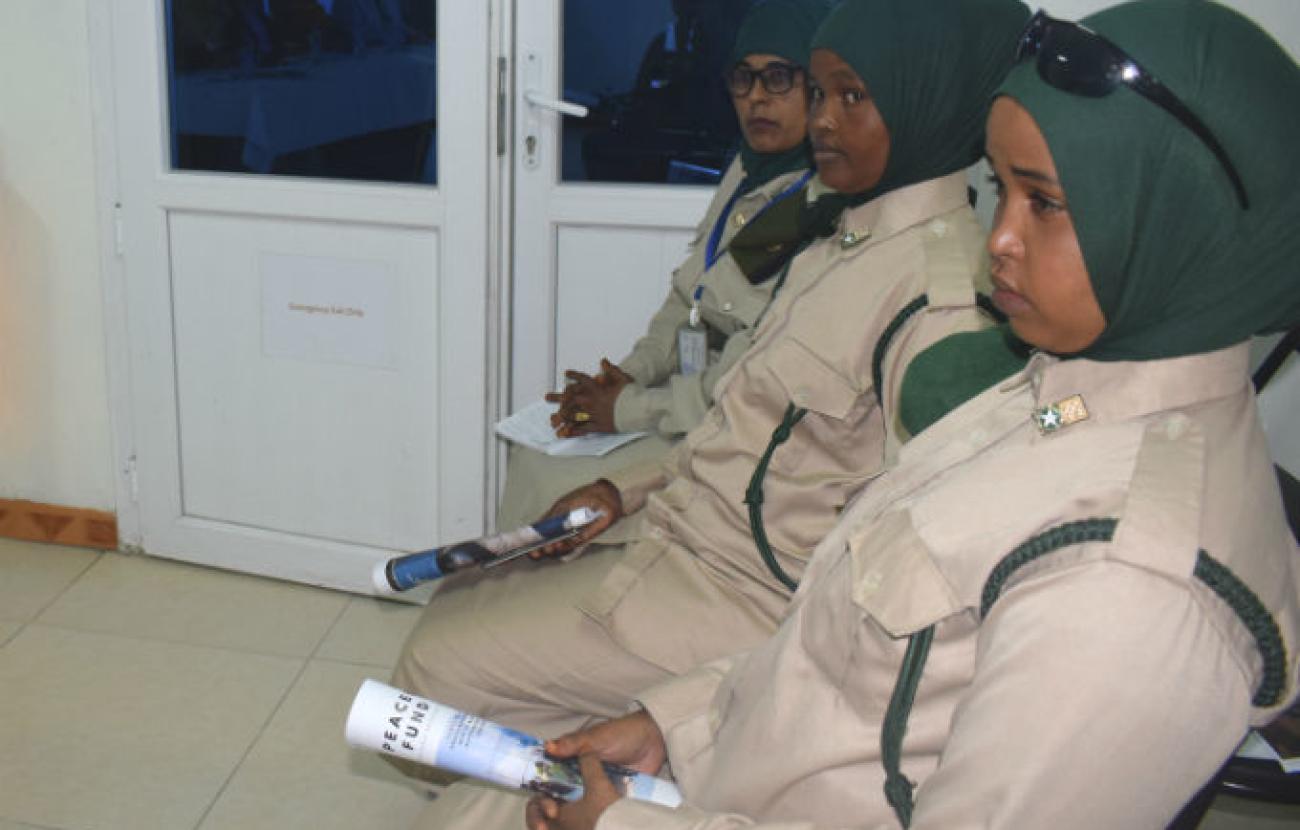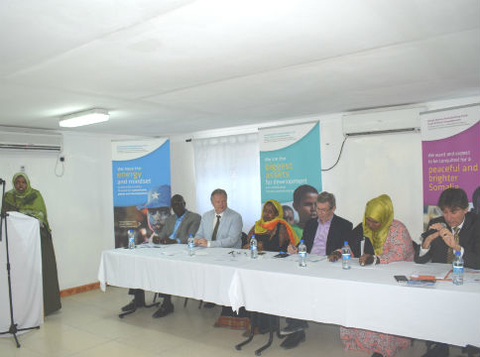Somalia launches the Peace Building Fund

The Federal Government of Somalia in conjunction with UNFPA and UN Habitat on 19 April 2018 launched the Peace Building Fund (PBF) worth $2 Million
The Federal Government of Somalia (FGS) in conjunction with UNFPA Somalia and UN Habitat Somalia on 19 April 2018 launched the Peace Building Fund (PBF) worth $2 Million. The PBF aims to facilitate youth political empowerment by enabling Somali young women and men to meaningfully engage in governance, peacebuilding and reconciliation efforts.
The launch was attended by high-level figures in Somalia including government ministers, donors and top UN officials.
Minister of Youth and Sports Honorable Khadija Diriye said at the launch that she was pleased with the efforts to include young people in the country’s development agenda saying historically, Somali youth were the driving force in establishing the state from colonial rule.
“Thirteen young activists formed the celebrated Somali Youth League in which they protested, lobbied for the rights of the nation and played a key role on Somalia’s road to independence in 1960,” said Honorable Diriye. She said the freedom fighters did not however have similar opportunities that the PBF is offering.
“The young people today are luckier than in the 1960s because they have more opportunities to prosper. As Somalia enters a new phase of state formation now, many young women and men are eager to be a part of the constructive efforts to rebuild this nation,” said Honorable Diriye.
She thanked the United Nations (UN) and donors for their support and keenness to support Somalia’s peace building initiative through young people adding that the youth aspire to having a socially inclusive society in which they feel valued, with opportunities to learn well, find decent work, engage productively in the community, have a voice and establish their own homes in a peaceful environment.
“We commit as the Ministry of Youth and Sports to support young people’s political participation at all levels,” said Honorable Diriye.

Deputy Special Representative for the United Nations Assistance Mission in Somalia (UNSOM) Mr. Peter de Clercq hailed the youth in Somalia for their tenacity and pledged strengthened UN support towards youth development and peace building initiatives.
“In some parts of the world you must be courageous to be a young person. Here’s to Somali youth for their tenacity and the bright future they are building for Somalia. I am pleased to help launch our UN Peace Building programme on youth political empowerment today,” said Mr. de Clercq.
He said the young people represent the future of Somalia and that they need to work on correcting the image of Somalia as one of the most dangerous places on earth.
Mr. Per Karlsson Head of Development Cooperation in the Somalia section of the Swedish Embassy commended the Federal Government of Somalia for adopting the Somalia Youth Policy in December 2017 as part of the efforts to empower the youth in the country.
“The launch of the Peace Building Fund is a very important step in the implementation of the Federal Government’s Youth Policy in Somalia. Sweden is one of the major donors to the Peace Building Fund and we share the belief that the launch is a tremendous effort for building a new and peaceful Somalia,” said Mr. Karlsson.
UNFPA Somalia Representative Nikolai Botev said Somalia is demographically young, with over two thirds of the population under the age of 25 saying there is great need to invest in them and that the PBF will contribute towards this investment.
“The large number of young people could spur economic growth if harnessed well, or could result in tensions and unrest if young people are left unemployed and disenchanted. Countries with the greatest demographic opportunity for development are those entering a period in which the working-age population has good health, quality education, decent employment and a lower proportion of young dependents. When this happens, the national economic payoff can be substantial,” said Mr. Botev.
UN Habitat Country Director for Somalia Mr. Doudou Mbye also highlighted the importance of engaging young women and men in decision-making and creating platforms and mechanisms for their direct participation in peace and state building processes.
“Young women and men are assured that they will be closely involved in the implementation of the PBF as decision makers, equal partners and agents of social change,” said Mr. Mbye, adding: “the future of Somalia lies in the hands of the youth. The project activities are designed to empower young women and men to become agents of change and peace through the provision of training, creation of participation platforms and intergenerational dialogue.”
The UN Peace Building Fund is currently supporting more than 120 projects in 25 countries by delivering fast, flexible and relevant funding. Since its creation to the end of 2015, PBF has allocated $623 million to 33 countries to help prevent (re)lapse into conflict and sustain peace.
Following a request from the General Assembly and the Security Council, the Secretary-General established a Peace Building Fund (PBF) for post-conflict peace building initiatives in October 2006. The PBF constitutes an essential component of the enhanced UN architecture to provide for a more sustained engagement in support of countries emerging from conflict and will support peace building activities which directly contribute to post-conflict stabilization and strengthen the capacity of governments, national/local institutions and transitional or other relevant authorities.
The PBF in Somalia allows young people to voice their challenges and grievances and raise their potential of inclusion in state and peace building processes through various expressive means. Through the creation of alternative plate forms using art, it promotes and increases their place in the society and provides new type of understanding and relations with other segment of the population, and in particular can bridge the gap with older people.
Art and cultural expression are important tools in promoting interaction amongst communities, expression of views and opinions and for facilitating discussions among and between communities to explore various understandings of peace and conflict and of broader socio-economic issues.
Link to original story



